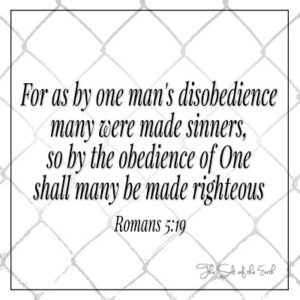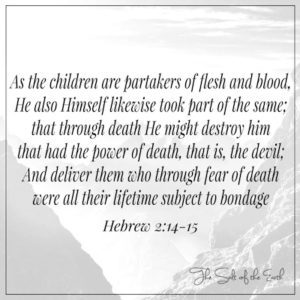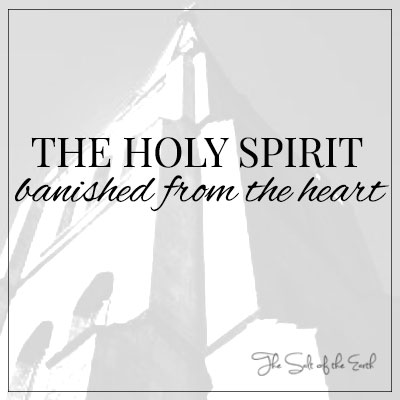When God had formed man of the dust of the ground, God breathed His breath of life in the nostrils of man, whereby man came to life and became a living soul. Man lived in communion with God until man became disobedient to God and sinned, and as a result, death entered man and the spirit died, and the spiritual connection between God and was broken. This spiritual connection between God and man was restored through the redemptive work of Jesus Christ and the coming of the Holy Spirit, whereby the breath of God returned into man and the dead came to life and the sons of God (sa a aplike a tou de gason ak fi) were born.
The breath of God brought man to life
And the Lord God formed man of the dust of the ground, and breathed into his nostrils the breath of life, epi lòm vin tounen yon nanm vivan (Jenèz 2:7)
The Spirit of God hath made me, and the breath of the Almighty hath given me life (Job 33:4)
On the sixth day, God created man. God formed man of the dust of the ground and breathed His breath of life into the nostrils of man (Adan). By the breath of God man came to life and became a living soul.
Man was one with God and lived in communion with God, until man chose to believe satan, advèsè Bondye a, above God.
Through disobedience to God and obedience to the serpent, man bowed to satan and submitted himself to him, whereby death entered and the spirit of man died. The spiritual connection between God and man was broken and the spirit of man came under the authority of death and when man would die, man would enter the kingdom of death.
From the fall of man, death and sin reigned in (tonbe) mankind and the seed of man had become corrupt, whereby everyone, who would be born of the seed of man would be born as a sinner; a son of the devil having his (peche) nature.
The reign of death in humanity became visible through the works of the sinful flesh, which derived from a corrupt mind and the evil nature of fallen humanity.
The law represented God’s will, holiness, and righteousness
Wherefore, as by one man sin entered into the world, and death by sin; and so death passed upon all men, for that all have sinned: (For until the law sin was in the world: but sin is not imputed when there is no law. Nevertheless death reigned from Adam to Moses, even over them that had not sinned after the similitude of Adam’s transgression, who is the figure of him that was to come (Women 5:12-14)
Before God chose Himself a people among all the nations on earth, and made His will known to them, sin and death already reigned in mankind. Sin and death didn’t come by the law. Through the law, ki reprezante volonte Bondye, holiness, and righteousness, sin was made known to mankind.
Moun sa yo, sa ki te fèt nan semans Jakòb la (pèp Izrayèl la) and were circumcised in the flesh, were privileged, that they belonged to God’s chosen people Israel.
They were privileged that the Almighty God, the Creator of the heaven and earth and all there is within, was their God and that they might know Him, through the law and the prophets, and that God would be with them.
However those, who rejected this privilege and broke God’s covenant, by choosing consciously to sin and live unrighteous, would receive the wages of sin, which is death.
While the Gentiles, who belonged to satan (the ruler of the world) and were controlled by death, walked in idolatry, maji, (seksyèl) malpwòpte, perversion, corruption, and all those things, that opposed the will of God, God’s people differentiated themselves from them through obedience to the law, which represented the will of God, whereby God’s people lived holy and righteous under God’s protection.
The law kept God’s people
Although God’s people also belonged to the generation of fallen man (the old man) and would enter the kingdom of death (hades) after living on earth, since they lived under the dominion of death, the law kept God’s people, through obedience to the law, and they were protected in God and had a special place in the kingdom of death, where they were protected against the torments and fiery flames (Lik 16:19-31)
Jesus fulfilled the law through His obedience
Think not that I am come to destroy the law, or the prophets: I am not come to destroy, but to fulfil. For verily I say unto you, Till heaven and earth pass, one jot or one tittle shall in no wise pass from the law, till all be fulfilled (Matye 5:17-18)
Jesus was born of the virgin Mary, who was overshadowed by the Holy Spirit. Although Jesus was born in the flesh and became equal to man, Jesus didn’t walk as man in obedience to the father of fallen man, dyab la. Death didn’t have dominion over Jesus, as death has dominion over fallen mankind, because Jesus was not born of the (corrupt) seed of man.
Jesus was born of God and belonged to God, which was visible by His walk on earth
Jesus saith unto him, Have I been so long time with you, and yet hast thou not known Me, Philip? he that hath seen Me hath seen the Father; and how sayest thou then, Shew us the Father? Believest thou not that I am in the Father, and the Father in Me? the words that I speak unto you I speak not of Myself: but the Father that dwelleth in Me, He doeth the works. Believe me that I am in the Father, and the Father in Me: or else believe me for the very works’ sake (Jan 14:9-11)
I do not ask for these only, but also for those who will believe in Me through their word, that they may all be one, just as you, Father, are in Me, and I in you, that they also may be in us, so that the world may believe that you have sent Me. The glory that you have given Me I have given to them, that they may be one even as we are one, I in them and you in me, that they may become perfectly one, so that the world may know that you sent me and loved them even as you loved me (Jan 17:20-23)
Jesus walked in obedience to His Father and spoke the words of His Father and did the things He had seen His Father do. Jesus spent a lot of time with His Father and did nothing outside His Spirit. The Father, the Son Jesus; Pawòl la, and the Holy Spirit lived in union and did everything together.
They were (e yo) One. Therefore They spoke the same words and acted the same, whereby They did the same works. They possessed the same nature and the same will and therefore Jesus differentiated Himself from man, who belonged to the generation of fallen man.
Although Jesus had come in the flesh, Jesus was a living Spirit.
Jesus was spiritual instead of carnal and walked in submission to God after the will of the Spirit through obedience to the words of His Father.
Jesus was led by the Holy Spirit, whereby Jesus didn’t perceive and act from His flesh; His senses, carnal mind, antiman, and emotions, but from the Spirit.
Though Jesus could sin, Jesus didn’t sin. There was no corruption in the flesh of Jesus.
Jesus was perfect in contrast to fallen man, who was born of corrupt seed and lived in a fallen state and a fallen position.
But through the fulfillment of the law and the perfect redemptive work of Jesus Christ and His resurrection from the dead, Jesus restored (grate) man in His state and reconciled man with God, whereby man was made whole (konplete, perfect) in Him (Li tou: How Jesus broke the covenant with death and the agreement with hell).
The perfect state of man was necessary, since only in the (espirityèl) perfect state of man, God could breathe His breath back again into man and His Spirit could live in man.
In the imperfect state of fallen man, this was impossible. Therefore God gave the written laws to His people, to make His nature and will known, because His carnal people couldn’t receive His Spirit.
Jesus came to fulfill the law and to create in Him, yon nouvo kreyasyon, who is perfect (konplete) in his state and restored in His position and reconciled with God (nan. 1 Korentyen 2:5-6, Kolosyen 2:10).
Jesus blew on His disciples
Then said Jesus to them again, Peace be unto you: as my Father hath sent me, even so send I you. And when he had said this, he breathed on them, and saith unto them, Receive ye the Holy Ghost: Whose soever sins ye remit, they are remitted unto them; and whose soever sins ye retain, they are retained (Jan 20:21-23)
On the day of His resurrection, the first day of the week, Jesus came to His disciples and said to them, that as the Father had sent Him, He would also send them.
Then Jesus breathed on His disciples, just like God breathed and the breath of life of God entered Adam. And Jesus said, receive the Holy Ghost: Whose sins you remit, they are remitted unto them and whose sins you retain, they are retained.
Jesus showed by breathing on them that the Spirit of God would return into man by the coming of the Holy Spirit. What in God is, would return in man.
The breath of God that returned into man
And when the day of Pentecost was fully come, they were all with one accord in one place. And suddenly there came a sound from heaven as of a rushing mighty wind, and it filled all the house where they were sitting. And there appeared unto them cloven tongues like as of fire, and it sat upon each of them. And they were all filled with the Holy Ghost, and began to speak with other tongues, as the Spirit gave them utterance (Zak 2:1-4)
On the Day of Pentecost, God breathed His breath into man and the life of God returned into man by the Holy Spirit, and the spirit was made alive and man became a living spirit.
The Holy Spirit came as a sound from heaven of a rushing mighty wind, the breath of God, and filled the whole house where all those, who obeyed the words of Jesus and were in one accord in one place, praying and waiting for the promise of the Holy Spirit (nan. Ezekyèl 37:7-14, Jan 3:8; 14:16-26; 15:26-27; 16:7-15).
The breath of God returned into man and everyone was filled with the Holy Spirit, whereby they began to speak in other tongues.
Tongues of God, which were part of the new creation, who is anointed in the Anointed, the Son, and therefore has been justified and made complete and as proof thereof received the Holy Spirit.
The spiritual connection between God and man, who is the crown of His creation, was restored and God could communicate and walk with man again, just like God communicated and walked with Adam from the beginning of creation (Li tou: Adan, where are you?)
The Holy Spirit lives in the sons of God and leads them
Se poutèt sa, frè m yo, nou se dèt, pa nan kò a, pou viv dapre lachè. Paske, si nou viv dapre lachè, n'a mouri: Men, si se grasa Lespri Bondye a nou mòtifye zèv kò a, n'a viv. Pou tout moun ki se Lespri Bondye a dirije yo, yo se pitit Bondye. For ye have not received the spirit of bondage again to fear; but ye have received the Spirit of adoption, whereby we cry, Abba, Father. The Spirit itself beareth witness with our spirit, that we are the children of God (Women 8:12-16)
In the Old Covenant (tonbe) man was separated from God and God could only communicate to His people through His prophets and His Son. But in the New Covenant man is justified in Christ and the spirit of man has been made alive by the Holy Spirit and reconciled with God and lives by the Holy Spirit, who dwells in the new creation, in union with the Father and the Son.
The Spirit, Who had to leave man because of the change of owner, could return into the lives of people and live in man. Not in the old man (sinner), whose spirit is dead and disconnected from God and belongs to the devil and lives under the authority of the devil and death, but in the new man (saint), who is justified in Christ and whose spirit is raised from the dead and made alive and has become a son of God and belongs to God.
The Holy Spirit dwells in the sons of God (sa a aplike a tou de gason ak fi), who are born of God, and shall lead the sons of God and shall bear witness with the spirit of man, that they are the children of God.
'Fè sèl latè a’






